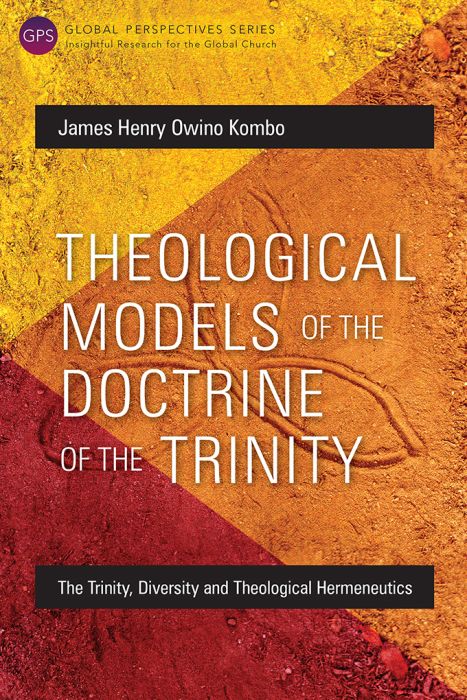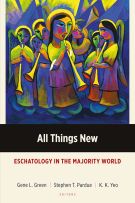| ISBN: | 9781783689064 |
|---|---|
| Imprint: | Langham Global Library |
| Format: | Paperback |
| Dimensions (mm): | 229 x 152 x 8 |
| Publication Date: | 30/08/2016 |
| Pages: | 148 |
| Language: | English |

Theological Models of the Doctrine of the Trinity
The Trinity, Diversity and Theological Hermeneutics
The doctrine of the Trinity is the foundational doctrine for all Christian theology, doxology and practice. In this publication James Kombo brings a unique and valuable contribution to understanding the Trinity and how God can be understood within the context of any culture and language.
Kombo first recognizes and brings into focus God’s self-presentation in Scripture as the triune God. Moving from the early church through various church traditions over the centuries, he interacts with how each tradition viewed God and their interpretation of the Trinity. Closing with a distinctly African view of God from the Luo language tradition, used mostly in Kenya and Tanzania, Kombo emphasises the benefits of considering alternative models of interpretation from various regions of the world. Kombo’s work applying his research across cultures makes this an excellent resource in any context of ministry and the academy.
Endorsements
A splendid work on the mystery of the Trinity and one of a kind from the African context – beautifully written and presented in ways both contextually relevant and doctrinally sound.
Joseph Galgalo
Associate Professor of Systematic Theology and Vice Chancellor
St Paul’s University, Kenya
The African church has been waiting for this book, and so have the rest of us who live outside Africa . . . A must read for anyone anywhere who wants to understand and worship the glory of the Trinity.
Gene L. Green
Professor of New Testament
Wheaton College, USA
Scholars, pastors, and theological students throughout the global church will benefit from this book’s valuable contribution to understanding the doctrine of the Trinity. This is an essential book for any student of World Christianity.
Jeffrey P. Greenman
President,
Regent College, Canada
Table of Contents
- Preface
- Introduction
- The Beginning Point
- Evangelical Formularies: The Problem of Language, New Developments, Faith Commitment and Secondary Theology
- The Point of Departure
- “Spoiling the Egyptians”
- Flow of the Book and Summary of Chapters
- Conclusion
- Chapter 1:
- Canons, Texts and Interpretations: Ideas of God among the Jews of Jesus’ Day
- 1.1 Introduction
- 1.2 Māšîah as an Interiorization of the God Relationship
- 1.3 Individuation of Wisdom
- 1.4 The Preexistent Logos
- 1.5 The Spirit of God
- 1.6 Conclusion
- Chapter 2:
- Testimonies of the Early Church: Christian Identity, Theological Language and the Creeds
- 2.1 Introduction
- 2.2 Christian Identity: The Third Race Question
- 2.3 Theological Language: Ousia, Hypostasis, Persona, Prosopon
- 2.4 The Creeds
- 2.5 Conclusion
- Chapter 3:
- God as Essence
- 3.1 Platonism, Neo-Platonism, Aristotelianism and Theology
- 3.2 St Augustine: God as the Godhead
- 3.3 Boethius: God as the Divine Substance
- 3.4 The Influence of Islam and Judaism: God as His Non-Divisible Essence
- 3.5 Thomas Aquinas: God as His Essence
- 3.6 Conclusion
- Chapter 4:
- God as Absolute Subject
- 4.1 Beginnings of Self-Consciousness
- 4.2 Karl Barth
- Self-Revelation
- God as the Father
- The Son
- The Holy Spirit
- Perichoresis
- 4.3 Karl Rahner
- Self-Communication
- God as the Father
- The Son
- The Holy Spirit
- Ordering the Modes
- 4.4 Renown Theologians in the Model
- 4.5 Conclusion
- Chapter 5:
- God as Community in Unity
- 5.1 Apophaticism
- 5.2 The Divine Energies
- 5.3 God as Father, Son and Holy Spirit
- 5.4 Hypostases Exist in Perichoresis
- 5.5 The Filioquism versus Monopatrism
- 5.6 The Father as Monarkhia
- 5.7 Renown Theologians in the Model
- 5.8 Conclusion
- Chapter 6:
- God as Nyasaye
- 6.1 The Great Distractions: Tylor’s Animism and Missionary Theologizing
- 6.2 The Access: Ubuntu Philosophy
- 6.3 The Trinitarian Moment
- 6.4 The Father: The Divine Monarchia
- 6.5 The Holy Spirit
- 6.6 The Son
- 6.7 Conclusion
- Bibliography
- Index





